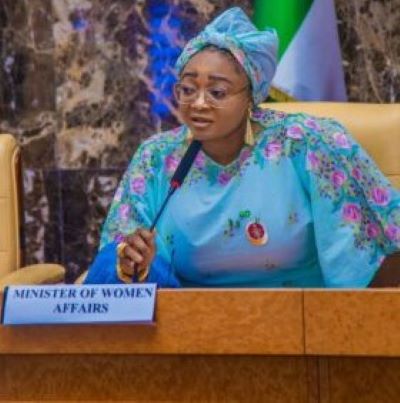Minister of Women Affairs, Imaan Sulaiman-Ibrahim, has called on African countries to reinforce policies and governance frameworks to safeguard children’s rights and eliminate harmful practices.
Speaking at the launch of the Community Children’s Fund at SOAS University of London, themed “Advancing Africa’s Agenda for Children 2040: Protecting Street-Connected Children in West Africa,” Sulaiman-Ibrahim emphasized the urgent need for action.
“Nigerian children account for 42% of our population, yet many face extreme vulnerabilities,” she said. “Among the 3 million displaced individuals in Borno, Adamawa, and Yobe, 59% are children who endure exploitation, violence, and lack of education.”
The minister highlighted stark challenges: Over 10.5 million Nigerian children of primary school age are out of school, with girls comprising 60%, Four out of ten girls are married before the age of 18, perpetuating cycles of poverty, and Child labour and malnutrition remain critical issues, with malnutrition contributing to 32% of deaths among children under five.
ALSO READ Trump moves to withdraw U.S. from WHO, raising concerns among experts
ALSO READ Bwari Area Council presents 2025 budget of ₦27.7bn
Sulaiman-Ibrahim noted similar patterns across Africa, underscoring the need for comprehensive interventions to empower children and create a safe environment for their development.
The Minister recommended that there should be robust policy implementation:
“It is critical to develop, fully implement, and enforce policies that protect children’s rights across the continent, including the domestication and execution of the Child Rights Act in every African nation,” she said.
She further recommended that adequate funding for child protection systems must be ensured for effectiveness, adding that “We must institutionalize accountability systems to monitor progress and ensure no child is left behind.”
According to her, the Community Children’s Fund is expected to finance grassroots interventions and foster burden-sharing among stakeholders.
Sulaiman-Ibrahim reiterated Nigeria’s dedication to partnerships with regional bodies, international organizations, and civil society groups to enhance child protection systems.
“We are prioritizing innovative financing mechanisms to scale initiatives and ensure sustainability. Most importantly, we are including children’s voices in policy formulation and implementation because no solution is complete without their input,” she affirmed.
The event highlighted the urgent need for African nations to prioritize children’s rights to break cycles of poverty and inequality, ensuring a brighter future for the continent.
By Justina Auta


